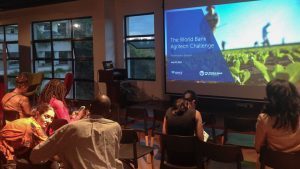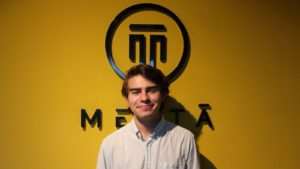News & Stories
Nairobi Dreams

Entrepreneurs wait for the start of the World Bank Agritech Challenge info session. The accelerator had 230+ applicants for three spots and an opportunity to co-create with East Africa’s largest agribusiness.
Expecting eyes glared at me from inside the conference room as I entered through the glass door and fidgeted with my clammy hands. I allowed my eyes to meet theirs before speaking out words with the power of shattering dreams.
“I’m sorry, but you’re just not what we’re looking for right now. You have a great idea so please consider applying next year.”
I knew they weren’t going to. This was the end of the road for their startup, and I was the executioner. The two co-founders left the office and re-entered the world of 40+ percent unemployment and the highest youth unemployment rate in East Africa.
I had the joy and challenge of working in Nairobi, Kenya, with a Hong Kong-based VC firm and corporate innovation accelerator called Nest. We were contracted by the World Bank to run the first open innovation agritech accelerator in East Africa, which seemed like a lottery jackpot to startup applicants in a world where side hustles (i.e. upselling fidget spinners) are what constitutes a “Series A.”
During my two months going through all the steps of building an accelerator, the most notable experience came in speaking with and selecting the startups.
Hearing people passionately share what they view as their life’s work gives you a certain sense of responsibility. It’s inspiring, gut-wrenching and tense. The truth is, not every startup idea is great. There aren’t unlimited funds for people to pursue moonshots and personal projects, and sometimes you have to be the one shutting doors. Although I learned a tremendous amount during my summer working in Nairobi, I am becoming more aware of my failures each day.
Through the UNC Kenan-Flagler Center for Entrepreneurial Studies Entrepreneurs Lab we met Alec Guettel, a serial entrepreneur and founder of Sungevity, Axiom Law and Imprint. Guettel’s path is anything but conventional – first circling through the government bureaucracy as a special assistant in the U.S. Environmental Protection Agency and then diving into environmental entrepreneurship.
I learned about failure from Guettel. With the folding of his latest startup, Sungevity, once hyped as a potential unicorn, he saw his passion crushed by investor unrest following the 2016 presidential election. He shared his story in our class in an accepting way, focusing more on key learnings and potential improvements he could have made rather than complaints about the situation.
Most importantly, Guettel spoke about the work that he now does with startups as an advisor and mentor. He works as a nurturer and connector. As someone who listens to challenges and does everything in his power to provide a solution. He has transitioned from an operator into an educator, pushing those he meets to improve and build better companies.
And this is where I realized my mistake.

Senior Sami Lachgar in the Metta co-working space in Nairobi. Metta is a subdivision of Nest and is one of East Africa’s largest co-working spaces and network.
Letting inspired youth walk out a door empty-handed in a country where nothing is taken for granted shouldn’t be an option. As somebody with a formal entrepreneurial education, it should’ve been my job to not only evaluate a startup and tell someone their ideas weren’t good enough, but also speak with them about why that was the case. I should have taken an additional 5 minutes with each startup, listened to their problems and attempted to provide an alternative way forward for them.
Guettel taught me that feedback is a crucial educational component in the real world, and I can’t wait to incorporate that lessons in future work focusing on entrepreneurship in developing countries.
By Sami Lachgar (BSBA 18’)